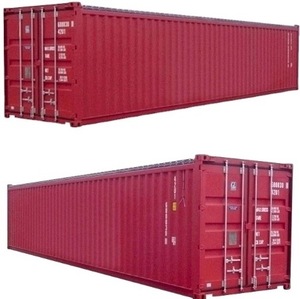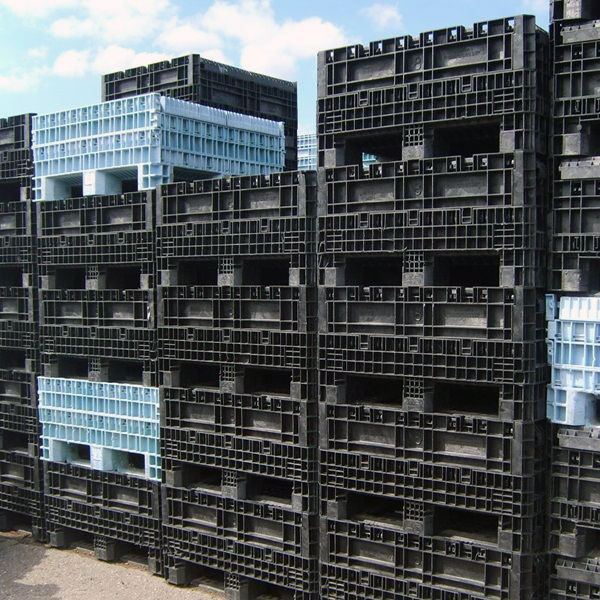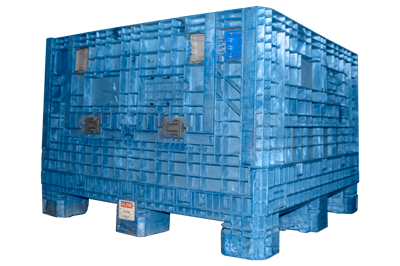Why refurbished bulk containers are eco-friendly solutions for sustainable businesses
Why Mass Containers Are Crucial for Cost-Effective and lasting Transportation
Mass containers play a vital function in modern logistics. They promote the effective movement of large amounts of items, thereby optimizing transport procedures. This approach not just reduces prices however also decreases ecological effect through reduced discharges and waste generation. As industries look for more lasting methods, the adoption of bulk containers is coming to be increasingly significant. What implications does this change hold for future logistics and supply chain monitoring?

The Benefits of Utilizing Mass Containers in Logistics
Bulk containers change logistics by boosting performance and sustainability. These containers permit the transportation of large quantities of products in a single trip, substantially reducing the number of trips called for. This not just simplifies procedures yet additionally decreases labor prices connected with handling, loading, and discharging. On top of that, mass containers are made to maximize room application within transportation lorries, making certain that more products can be shipped simultaneously.
The standardization of mass containers additionally simplifies the logistics process. With uniform measurements, they can be conveniently piled and kept, causing enhanced warehouse monitoring. Bulk containers typically feature resilient materials that shield components from damage throughout transportation, thus lowering item loss and boosting general reliability. As an outcome, services can experience enhanced supply chain efficiency, ultimately bring about boosted success and consumer contentment. This combination of factors makes mass containers an important asset in modern-day logistics.
Environmental Influence: Lowering Waste and Carbon Impact
As markets significantly focus on sustainability, the fostering of mass containers has arised as a key method for minimizing waste and lowering carbon footprints. These containers decrease the use of product packaging materials, such as boxes and plastic, consequently especially reducing overall waste generation. By combining deliveries, mass containers enhance transportation effectiveness, permitting for more products to be transported per trip. This decrease in journeys directly correlates with lower greenhouse gas exhausts, adding to a smaller carbon impact.
Bulk containers can frequently be reused or recycled, additionally minimizing ecological influence. The resilience of these containers warranties they can hold up against multiple transportation cycles, minimizing the demand for single-use options. used plastic containers. By enhancing logistics and advertising effective resource usage, mass containers not only support sustainable methods but additionally motivate markets to line up with international ecological goals. Eventually, their application reflects a commitment to environmental stewardship and accountable source management
Cost Cost Savings: Just How Mass Containers Lower Transport Costs
While several firms look for methods to improve their lower line, making use of bulk containers presents a significant opportunity for decreasing transport costs. Bulk containers maximize the volume of items delivered, enabling companies to deliver bigger amounts at when. This efficiency lowers the variety of journeys called for, straight reducing fuel prices and reducing labor expenses related to loading and discharging.
Additionally, mass containers frequently include streamlined layouts that optimize space application within transport lorries. This implies less voids, resulting in extra efficient use of readily available capacity. The longevity of bulk containers can decrease the risk of item damages during transportation, reducing losses and making sure that more products get here undamaged.
Enhancing Supply Chain Effectiveness With Mass Storage Space Solutions
Bulk storage space solutions play a necessary duty in enhancing supply chain effectiveness by maximizing inventory management. By combining items right into less, bigger containers, organizations can substantially reduce handling costs connected with frequent transfers and processing. This streamlined method permits far better monitoring and monitoring of inventory, eventually resulting in enhanced functional performance.
Streamlined Stock Administration
Efficient stock monitoring is vital for enhancing supply chain operations, especially when organizations adopt bulk storage services. These services enable services to preserve higher supply degrees while minimizing the regularity of replenishment. By settling products right into bulk containers, companies can streamline their inventory procedures, lowering the intricacy linked with tracking several smaller packages. This strategy promotes exact supply counts and improves projecting precision, enabling for more enlightened decision-making. In enhancement, mass storage space remedies simplify storage facility organization, making it less complicated to find and gain access to items when required. Consequently, organizations can attain a more reliable stock turnover price, eventually enhancing total supply chain performance and minimizing the likelihood of stockouts or overstock situations.

Reduced Handling Expenses
The implementation of bulk storage space solutions not only improves stock monitoring but likewise significantly lowers dealing with expenses throughout the supply chain. By settling products right into mass containers, companies reduce the need for regular handling and transfer between various storage space and transportation units. This method reduces labor costs connected with loading, dumping, and moving smaller sized bundles. Furthermore, mass storage space minimizes the regularity of deliveries, resulting in lower transport expenses and lowered gas usage. As an outcome, organizations can enhance their logistics procedures, permitting for a much more reliable allotment of resources. Eventually, minimized managing prices add to improved general supply chain effectiveness, promoting an atmosphere that supports both sustainability and economic practicality.

Convenience of Bulk Containers Across Different Industries
Lots of sectors have distinct requirements for transportation and storage, bulk containers have emerged as a flexible option that satisfies a wide array of demands. These containers, varying from huge containers to specialized containers, can suit varied products, consisting of granules, powders, and fluids. In the farming market, mass containers facilitate the transport of grains and fertilizers, while the food and beverage industry utilizes them for components and completed products. The chemical market depends on bulk containers for safely delivering unsafe products, ensuring compliance with security policies. Additionally, building companies take advantage of bulk containers for carrying aggregates and other materials. Their adaptability reaches various settings of transport, consisting of trucks, trains, and ships, improving logistical efficiency. This flexibility not just streamlines operations throughout different industries but also advertises sustainability by minimizing packaging waste and optimizing room in transportation. Bulk containers play an essential duty in contemporary supply chain management.
Future Trends in Mass Container Use and Sustainability
The future of mass container usage is significantly formed by innovative products advancement that enhances sustainability. In addition, automation in logistics guarantees to enhance procedures, decreasing waste and improving performance. Welcoming circular economy practices will certainly further transform exactly how bulk containers are made, utilized, and reused, fostering an extra sustainable transport landscape.
Cutting-edge Materials Advancement
As sectors increasingly focus on sustainability, cutting-edge materials development wholesale containers emerges as a substantial consider improving green transportation options. Scientists and manufacturers are discovering biodegradable plastics, recycled composites, and lightweight metals to minimize ecological influence. These products not just minimize waste but likewise enhance gas performance by lowering the overall weight of containers. Additionally, improvements in clever products, which can adjust to differing problems, enhance the longevity and capability of mass containers. The combination of these cutting-edge products straightens with round economy principles, advertising reuse and recycling. As the need for lasting methods grows, the advancement of website such materials will certainly play a vital role fit the future of bulk container usage in logistics and transport.
Automation in Logistics
Substantial advancements in automation are poised to transform logistics and the utilization of bulk containers, enhancing sustainability in transport. Automated systems, consisting of drones and independent lorries, are streamlining the movement of bulk containers, minimizing the dependence on standard fuel-powered transportation. These innovations enhance directing and loading procedures, reducing empty miles and boosting fuel performance. Furthermore, automated inventory monitoring systems improve tracking and surveillance of bulk containers, making certain much better source allotment and reduced waste. The assimilation of the Web of Things (IoT) permits real-time data evaluation, allowing aggressive decision-making that lines up with sustainability goals. As automation remains to evolve, it is anticipated to drive further technologies wholesale container use, inevitably supporting even more sustainable logistics techniques and minimizing the environmental influence of transportation.
Circular Economic Climate Practices
Developments in automation are setting the phase for a more incorporated method to round economic situation techniques in the domain name of mass container use. As markets progressively accept sustainability, mass containers are being developed for longevity and reusability. This shift not only lessens waste yet additionally boosts resource performance. Business are embracing techniques such as closed-loop systems, where utilized containers are collected, reconditioned, and reestablished right into the supply chain. Additionally, smart innovations track container life process, facilitating much better monitoring and reducing ecological impact. The partnership in between makers, logistics companies, and end-users is necessary in developing criteria for sustainable container use. refurbished bulk containers. Future trends indicate an expanding focus on products that are biodegradable and recyclable, further reinforcing the circular economy's principles wholesale transportation

Often Asked Inquiries
What Materials Are Mass Containers Usually Made From?
Bulk containers are typically built from durable products such as high-density polyethylene, steel, cardboard, and aluminum. These materials supply toughness, defense, and versatility, making them suitable for carrying different products in various sectors effectively.
Just how Do I Pick the Right Dimension Bulk Container?
Choosing the appropriate size mass container includes evaluating the quantity of products to be carried, taking into consideration handling devices compatibility, and evaluating storage room needs. Appropriate size guarantees efficiency in transport and minimizes waste during delivery.
Are Bulk Containers Reusable or Recyclable?
Mass containers are commonly reusable, designed for multiple trips, improving sustainability. Lots of can additionally be reused, relying on the products made use of. Picking recyclable alternatives better reduces and supports ecological goals waste in transport methods.
What Safety And Security Rules Put On Mass Container Transport?
Safety laws for bulk container transport include conformity with the Department of Transport guidelines, proper labeling of dangerous materials, structural integrity assessments, and adherence to weight restrictions to assure safe handling and stop accidents throughout transit.
Exactly How Can Businesses Shift to Using Bulk Containers Effectively?
Organizations can change to bulk containers by reviewing present logistics, educating personnel on handling, buying suitable tools, optimizing stock management, and working together with vendors to ensure compatibility and efficiency throughout the supply chain.
As sectors progressively focus on sustainability, the adoption of mass containers has actually arised as an essential strategy for minimizing waste and reducing carbon footprints. By settling materials right into mass containers, firms can simplify their inventory procedures, decreasing the intricacy linked with tracking multiple smaller sized bundles. As markets increasingly focus on sustainability, cutting-edge products advancement in bulk containers emerges as a considerable element in boosting eco-friendly transportation remedies. Automated systems, consisting of drones and independent vehicles, are enhancing the motion of mass containers, reducing the reliance on typical fuel-powered transportation. Furthermore, automated supply monitoring systems boost monitoring and tracking of mass containers, making sure much better resource allowance and decreased waste.